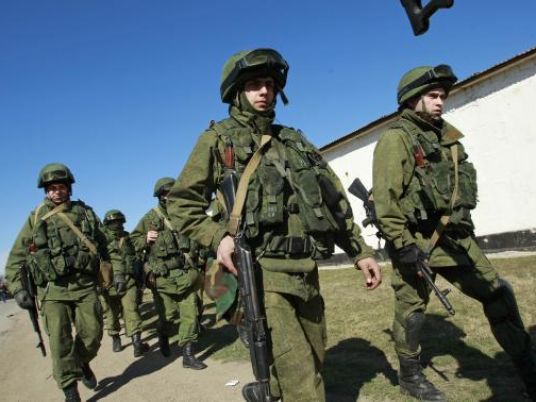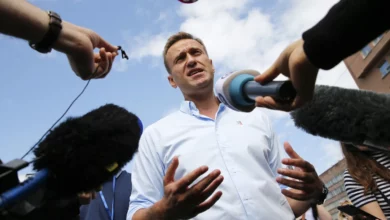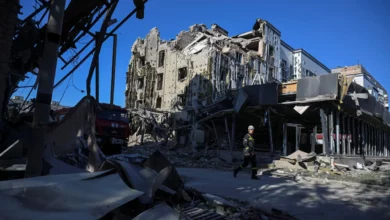
President Vladimir Putin ordered troops involved in a military exercise in western Russia back to base on Tuesday in an announcement that appeared intended to ease East-West tension over fears of war in Ukraine.
Russian financial markets rebounded after sharp falls on Monday, and the euro and dollar rose in Japan, though Moscow's forces remained in control of Ukraine's Crimea region, seized bloodlessly after Russian ally Viktor Yanukovich was ousted as Ukrainian president last month.
Russia paid a heavy financial price on Monday for its military intervention in Ukraine, with stocks, bonds and the ruble plunging as Putin's forces tightened their grip in Crimea, whose population is mainly ethnic Russian.
The Moscow stock market fell 10.8 percent on Monday, wiping nearly $60 billion off the value of Russian firms, but Russian stock indexes rose more than 4 percent early on Tuesday before slipping back again slightly, though still up on the day.
Putin declared at the weekend that he had the right to invade Ukraine to protect Russian interests and citizens after Yanukovich's downfall following months of popular unrest. Russia's Black Sea Fleet has a base in Crimea.
But the military exercises in central and western Russia, which began last week and raised fears that Russia might send forces to neighbor Russian-speaking regions of east Ukraine, were completed on schedule.
"The supreme commander of the armed forces of the Russian Federation, Vladimir Putin, gave the order for the troops and units, taking part in the military exercises, to return to their bases," Kremlin spokesman Dmitry Peskov was quoted as saying by Russian news agencies.
Although the end of the exercises had been planned, the announcement sent a more conciliatory message than much of the rhetoric from Russian officials, who say Moscow must defend national interests and those of compatriots in Ukraine.
Putin is dismayed that the new leadership in Ukraine, the cradle of Russian civilization, has plotted a course towards the European Union and away from what had been Moscow's sphere of influence during generations of Soviet Communist rule.
Moscow's U.N. envoy told a stormy meeting of the Security Council that Yanukovich had sent a letter to Putin requesting he use Russia's military to restore law and order in Ukraine.
Western response
The United States has begun spelling out its response to Russia's incursion, announcing a suspension of all military engagements with Russia, including military exercises and port visits, and freezing trade and investment talks with Moscow.
President Barack Obama had more than two hours of talks on Monday with his national security advisers to discuss what steps the United States and its allies could take to "further isolate" Russia, a White House official said.
"Over time this will be a costly proposition for Russia. And now is the time for them to consider whether they can serve their interests in a way that resorts to diplomacy as opposed to force," Obama told reporters.
The State Department said the United States was preparing to impose sanctions on Russia over the intervention, although no decisions had yet been made.
Members of the U.S. Congress are looking at options including sanctions on Russia's banks and freezing assets of Russian public institutions and private investors, but they said they wanted European states to step up their involvement.
U.S. Secretary of State John Kerry will propose ways for a negotiation between Russia and Ukraine to be overseen by a multilateral organization when he visits Kiev on Tuesday, Obama said.
An International Monetary Fund mission is also in Kiev to discuss financial assistance for Ukraine to help it avoid bankruptcy. Kiev's new leaders want a financial package worth at least $15 billion, with a quick release of some of the cash.
The European Union has threatened unspecified "targeted measures" unless Russia returns its forces to their bases and opens talks with Ukraine's new government.
Western leaders have sent a barrage of warnings to Putin against armed action, threatening economic and diplomatic consequences, but are not considering a military response.
There was no immediate sign of any new movements by Russian forces in Crimea overnight although Ukraine's acting president said on Monday that Russia's military presence on the Black Sea peninsula was growing.
Ukrainian officials said Russia was building up armor on its side of the 4.5-km (2.7- mile) wide Kerch strait between the Crimean peninsula and southern Russia.
Russian forces shipped three truckloads of troops by ferry into Crimea after taking control of the border post on the Ukrainian side, Ukraine's border guards spokesman said. A Reuters news team reported no sign of more troops arriving from Russia on Tuesday and said the situation was static.
Kiev's U.N. ambassador, Yuriy Sergeyev, said Russia had deployed roughly 16,000 troops to Crimea since last week.
Economic damage
Both sides have avoided bloodshed, but the market turmoil on Monday highlighted damage the crisis could wreak on Russia's vulnerable economy, making it harder to balance the budget and potentially undermining business and public support for Putin.
Ukraine called up reservists on Sunday after Putin's action provoked what British Foreign Secretary William Hague called "the biggest crisis in Europe in the twenty-first century".
NATO allies will hold emergency talks on the crisis on Tuesday, for the second time in three days, following a request from Poland, a neighbor of Ukraine.
EU foreign ministers held out the threat of sanctions against Russia if Moscow fails to withdraw its troops from Ukraine, while offering to mediate between the two, alongside other international bodies.
EU leaders will hold an emergency summit on Thursday.
The Organisation for Security and Cooperation in Europe, or OSCE, said it was trying to convene an international contact group to help defuse the crisis after Germany said Chancellor Angela Merkel had persuaded Putin to accept such an initiative.
Switzerland, which chairs the pan-European security body, said the group could discuss sending observers to Ukraine to monitor the rights of national minorities.
"There will be very, very broad consensus for that monitoring mission. We call on Russia to join that consensus, make the right choice and pull back its forces," U.S. Assistant Secretary of State Victoria Nuland told OSCE envoys in Vienna.
The Russian central bank raised its key lending rate by 1.5 percentage points on Monday after the ruble sank to all-time lows. The ruble edged up against the dollar on Tuesday.
Tension over Ukraine also knocked 2 to 3 percent off European stock markets and 1 percent off Wall Street on Monday, and sent safe haven gold to a four-month high.




